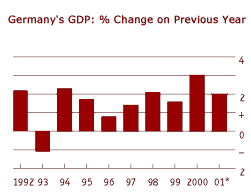 |
|

•Table of Contents •Subscribe here •Give a Gift •Customer Service •Classroom Use •Students click here |
From the July 2001 issue of
World Press Review (VOL.48, No.7)
A Lackluster Economic Report CardBettina Bonde, Frankfurter Allgemeine Zeitung (conservative)Frankfurt, Germany May 7, 2001
Production capacity in the economy is no longer increasing; in fact, it is declining slightly, though admittedly from a relatively high level. In their spring reports, though, the six leading German economic research institutions said this should not be understood as evidence of significant economic weakness and certainly not as an indication of a looming recession. The economic cooling off should also not be taken as justification for hasty action by either the European Central Bank, which ought to keep to its two-pronged strategy of tracking money-supply growth and inflationary indicators, or by German politicians, though they are faced now with lower-than-expected revenues. So, no recession—but the economy is no longer as buoyant as it was. Even the German federal government lowered its forecast for 2001. The gross domestic product is below what was “planned” and so are the tax revenues. That said, recent German manufacturing figures are hardly that disturbing. Industrial output was up 8 percent in January and February from the previous year. The German Finance Ministry characterized it as “remarkably robust,” but industry is still living off the increase in incoming orders from the last months of 2000. Growth at the beginning of this year has been supported by a still buoyant export economy and a weak euro. Meanwhile, incoming orders are suffering. Orders at the start of 2001 were lower than at the end of 2000. February’s seasonally adjusted orders stagnated at January’s level. More important, foreign orders have slackened in the first two months of the year, down 5 percent from November-December. The first effects of a cooling of the global economy cannot be overlooked in Germany. That means government will have to save in light of retreating tax revenues. Mainly the domestic construction industry has begun to feel the effects of government saving. Construction output did pick up in February because of warmer weather, but one is hard-pressed to call it a recovery, since output in January and February fell 10 percent from the previous year. Even in the face of these recent, more pessimistic forecasts, [Chancellor Gerhard Schröder’s] government remains optimistic—perhaps not a wholly unjustified stance. Just how much consumers spend and businesses invest is ultimately a function of their respective expectations of future developments. Optimism can therefore be a self-fulfilling prophecy. The Ifo [Germany’s largest economic research institute] business-climate index shows that the manufacturing industry rates the current business climate, and future perspectives, less optimistically than one month ago. Many economic researchers expect strong growth impulses from recent tax cuts taking effect by summer. But there is little to see of that so far. Rising oil prices drove up the cost of energy and considerably reduced consumer-spending power—despite the tax reform. Heating and fuel prices did drop again in March, but an increase in gas prices by oil companies just before Easter will serve to nullify any gains for consumers. Food prices also are higher, particularly fruit and of course meat, because of the mad cow and foot-and-mouth epidemics. The Federal Statistics Office calculated a 2.8-percent increase in consumer prices in April from the previous year—the largest price increase in nearly seven years. Revenues from social-security contributions will cause concern for the federal government. Contributions move with wage increases and employment. The number of unemployed, however, has been declining more slowly than had been calculated for in the federal budget. The unusually miserable weather in the second half of March is blamed for the fact that seasonally adjusted unemployment figures rose in April to 3.9 million [9.5 percent]. It is likely that the weakening economic growth is already making its impact on the labor market. All this has already set off a debate about how the government should address its budgetary shortcomings. The alternatives are either higher government debt or cuts in expenditures. Party financial experts are warning against giving up on budgetary restraint, arguing that when revenue declines, spending must fall in line. Don’t endanger the budgetary consolidation already achieved, they warn. The research institutes make the case for letting the “automatic stabilizers” of fiscal policy do their job. They suggest that fiscal policies be oriented more toward medium-term expenditure programs while accepting that temporary budget deficits might occur. Bank economists point out that the current, relatively weak economic downturn reveals how susceptible the government’s budget is to economic cycles. They call for budgetary discipline.
|
|
|||||||||||||||||||||||

